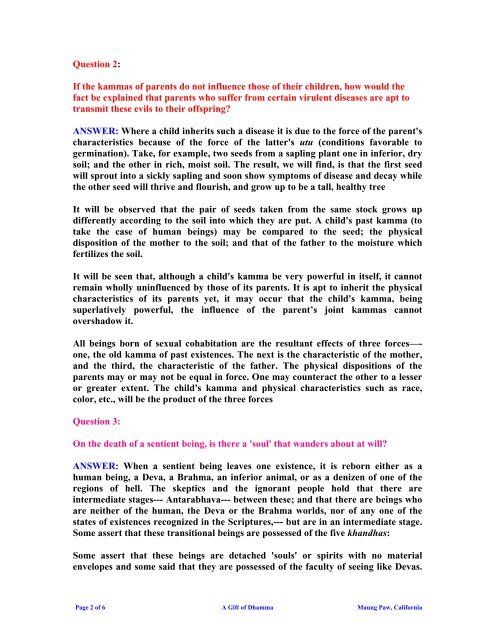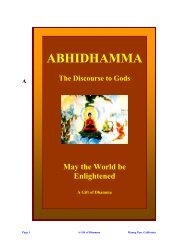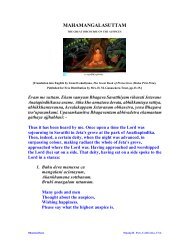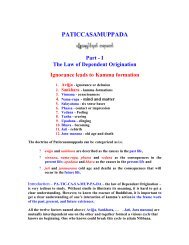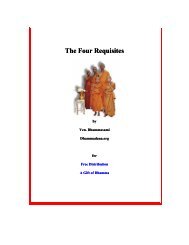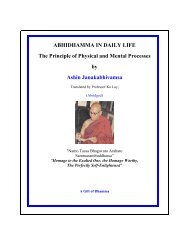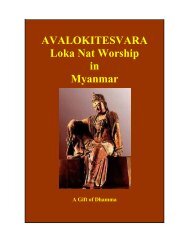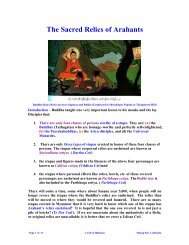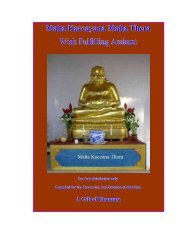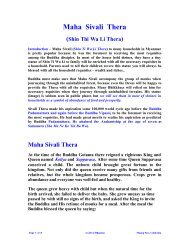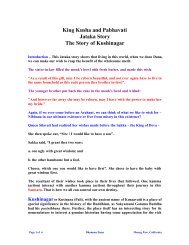Five Questions on Kamma.pdf
Five Questions on Kamma.pdf
Five Questions on Kamma.pdf
You also want an ePaper? Increase the reach of your titles
YUMPU automatically turns print PDFs into web optimized ePapers that Google loves.
Questi<strong>on</strong> 2:<br />
If the kammas of parents do not influence those of their children, how would the<br />
fact be explained that parents who suffer from certain virulent diseases are apt to<br />
transmit these evils to their offspring?<br />
ANSWER: Where a child inherits such a disease it is due to the force of the parent's<br />
characteristics because of the force of the latter's utu (c<strong>on</strong>diti<strong>on</strong>s favorable to<br />
germinati<strong>on</strong>). Take, for example, two seeds from a sapling plant <strong>on</strong>e in inferior, dry<br />
soil; and the other in rich, moist soil. The result, we will find, is that the first seed<br />
will sprout into a sickly sapling and so<strong>on</strong> show symptoms of disease and decay while<br />
the other seed will thrive and flourish, and grow up to be a tall, healthy tree<br />
It will be observed that the pair of seeds taken from the same stock grows up<br />
differently according to the soil into which they are put. A child's past kamma (to<br />
take the case of human beings) may be compared to the seed; the physical<br />
dispositi<strong>on</strong> of the mother to the soil; and that of the father to the moisture which<br />
fertilizes the soil.<br />
It will be seen that, although a child's kamma be very powerful in itself, it cannot<br />
remain wholly uninfluenced by those of its parents. It is apt to inherit the physical<br />
characteristics of its parents yet, it may occur that the child's kamma, being<br />
superlatively powerful, the influence of the parent’s joint kammas cannot<br />
overshadow it.<br />
All beings born of sexual cohabitati<strong>on</strong> are the resultant effects of three forces—-<br />
<strong>on</strong>e, the old kamma of past existences. The next is the characteristic of the mother,<br />
and the third, the characteristic of the father. The physical dispositi<strong>on</strong>s of the<br />
parents may or may not be equal in force. One may counteract the other to a lesser<br />
or greater extent. The child's kamma and physical characteristics such as race,<br />
color, etc., will be the product of the three forces<br />
Questi<strong>on</strong> 3:<br />
On the death of a sentient being, is there a 'soul' that wanders about at will?<br />
ANSWER: When a sentient being leaves <strong>on</strong>e existence, it is reborn either as a<br />
human being, a Deva, a Brahma, an inferior animal, or as a denizen of <strong>on</strong>e of the<br />
regi<strong>on</strong>s of hell. The skeptics and the ignorant people hold that there are<br />
intermediate stages--- Antarabhava--- between these; and that there are beings who<br />
are neither of the human, the Deva or the Brahma worlds, nor of any <strong>on</strong>e of the<br />
states of existences recognized in the Scriptures,--- but are in an intermediate stage.<br />
Some assert that these transiti<strong>on</strong>al beings are possessed of the five khandhas:<br />
Some assert that these beings are detached 'souls' or spirits with no material<br />
envelopes and some said that they are possessed of the faculty of seeing like Devas.<br />
Page 2 of 6 A Gift of Dhamma Maung Paw, California


